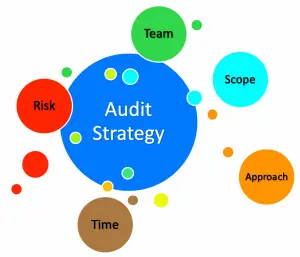Audit Strategy
Definition
 Audit strategy is the overall approach that auditors take to perform the audit work. In this case, auditors need to establish an overall audit strategy that sets the scope, timing, and direction of an audit at the planning stage.
Audit strategy is the overall approach that auditors take to perform the audit work. In this case, auditors need to establish an overall audit strategy that sets the scope, timing, and direction of an audit at the planning stage.
Auditors usually use the audit strategy as the basis for preparing the audit plan that would list the audit procedures that needed to be performed for each relevant assertion of significant accounts and balances in financial statements.
Auditors may need to change an overall audit strategy during the course of the audit if they obtain any findings that require them to revise the audit plan.
Purpose of Audit Strategy
The main purpose of the audit strategy is to minimize the audit risks and to perform the audit in an efficient and effective manner. It allows auditors to determine the number of resources needed and what level of experience and expertise is required in the audit work.
It helps auditors to put the right people in the right place; e.g. allocate the audit staff based on their skills, knowledges, and experiences. Additionally, it also allows auditors to determine how the resources should be managed, directed, and supervised. In this case, the audit strategy can assist in setting the timing for meetings, guiding the team members on performing their tasks, and performing reviews of the audit work by the senior members of the audit team.
Audit strategy also involving in designing a suitable audit approach including the test of control and substantive test. For example, auditors may decide to perform the test of control and reduce some of their substantive works if they intend to rely on the client’s internal control. Or they may decide to go directly to substantive tests without placing reliance on internal control.
Matters to consider when establishing an audit strategy
After auditors assess the risk and determine the areas where misstatements in the financial statements may occur, they need to design and establish an appropriate audit strategy to respond to the risks and potential misstatements.
When establishing an overall audit strategy, auditors need to consider the following matters:
| Matters to consider when establishing the overall audit strategy | |
|---|---|
| Characteristics of the engagement | For example, what accounting standards client uses, which industry it is in, where is the location of branches or subsidiaries, any need for expert, what is reporting currency, etc. |
| Reporting objectives, timing of the audit, and nature of communication | For example, the timing for reporting, meeting with management, nature, and timing of communication with team members, any expected communications, etc. |
| Significant factors and preliminary engagement activities | For example, determining materiality, risk assessment, evidence of management’s commitment and importance of internal controls, volume of transactions, any significant changes in business, industry, and reporting requirement, etc. |
| Nature, timing, and extent of resources | For example, selecting the engagement team, assigning the work to the team members, and budgeting the engagement (e.g. how much time needed on a certain area), etc. |
Contents of Audit Strategy
Contents of audit strategy may be different from one accounting firm to another. However, the audit strategy usually includes the following contents below:
| Contents of Audit Strategy | |
|---|---|
| Overview | This section summaries the engagement and responsibilities of auditors e.g. giving an opinion on financial statements and evaluating client’s practices regarding value for money. |
| Significant risks | This section of audit strategy contents describes significant risks and how auditors will deal with them. |
| Audit scope and approach | It describes what audit standards and approach auditors use and whose works auditors will rely on e.g. the work of internal audit and expert, etc. |
| Materiality | Materiality in this part may include both overall materiality and performance materiality. |
| Audit engagement team | In this section, it usually describes senior team members including team leader and team manager. |
| Timetable and deliverables | This is where auditors describe the timetable of the audit with deliverable documents. |
| Independence | This is the part of the audit strategy contents that describes how auditors ensure their independence in the audit engagement. |